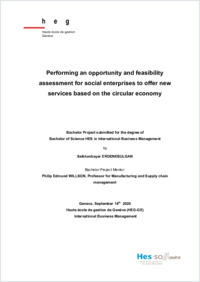Performing an opportunity and feasibility assessment for social enterprises to offer new services based on the circular economy
SONAR|HES-SO
- Erdenebulgan, Saikhanbayar
- Willson, Philip Edmund (Degree supervisor)
-
2020
73 p.
Mémoire de bachelor: Haute école de gestion de Genève, 2020
English
Global warming and environmental disasters are threatening the existence of humanity and businesses. As a result, many organizations and governments seek to reduce their harmful effects. They are trying to change the economic paradigm and pay more attention to social inequalities. Thus, the circular economy is a new model of an economy that can create this change. More and more businesses are becoming circular, and at the same time, they are seeing its benefits. Another element that is disrupting the economic environment is the advance of technology. The situation is either perceived as an opportunity or a threat to humanity, as it could destroy some jobs. The advent of technological advances highlights the importance for businesses to make the right transition in order to stay profitable and sustain in the long term. If these different events are not controlled, societal fragmentation will only be worsened. Thus, in this research, it was necessary to see how social enterprises which employ people on the margin of society because of a disability or a precarious situation, could continue to innovate in business and sustain their existence in today's changing and uncertain environment. In order to evaluate the study, a pilot project on the circular economy was carried out in partnership with a social enterprise. Moreover, the research instruments of survey and interviews with different stakeholders helped gather essential insights and allowed to elaborate more ideas about the research topic and assess diligently how the circular economy could provide societal benefits in general. The study brings forth relevant recommendations for companies. Firstly, to allow them to reach the triple bottom line with the focus on creating social value. To do so, enterprises are urged to integrate social aspects into their circular economy paradigm. Moreover, it is crucial for businesses to be aware of end-user and consumer opinions and trends. Consumers look for products and services that have positive impacts on the environment and society. From this perspective, companies could use this insight as an opportunity to leverage their corporate social responsibility or even create more benefits in their businesses. Finally, enterprises could combine their in-house core competencies to use them as pillars to transit in the future of works. Indeed, these recommendations could help to perpetuate companies, increase business profitability as well as to allow them to diversify their business activities. In conclusion, the project highlights a circular social enterprise that could rely on its employees' competencies to be agile and innovate. And as a matter of fact, new business opportunities that could be integrated into their incumbent business model have emerged from this experience.
- Language
-
- English
- Classification
- Economics
- Notes
-
- Haute école de gestion Genève
- International Business Management
- hesso:hegge
- License
- License undefined
- Identifiers
-
- RERO DOC 329841
- Persistent URL
- https://sonar.ch/global/documents/315006
Statistics
Document views: 104
File downloads:
- TBIBM_2020_ERDENEBULGAN_Saikhanbayar_2020.pdf: 185
